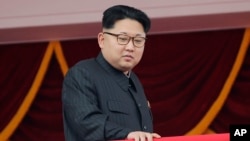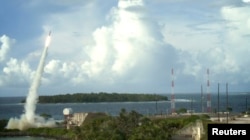North Korea says it is closing one of the last lines of communication with the United States in retaliation for Washington placing sanctions on leader Kim Jong Un for human rights abuses.
Pyongyang said Monday it has told the U.S. the North is effectively ending all diplomatic communications with Washington that have been conducted through the U.N. offices in New York.
Last week, the U.S. placed personal sanctions on Kim and several other North Korean officials, in addition to sanctions already in place on the country for Pyongyang's nuclear weapons program.
Earlier Monday, North Korea threatened to take "physical action" after the U.S. and Seoul announced plans for deployment of a sophisticated missile defense system in South Korea.
Pyongyang made the threat several days after Washington and Seoul revealed plans to use the Terminal High Altitude Area Defense system — THAAD — on the Korean peninsula following a series of ballistic missile and nuclear tests by Pyongyang. The location and timing of the deployment have not been announced.
Pyongyang's official KCNA news agency, using its typical bellicose style, said "It is the unwavering will of our army to deal a ruthless retaliatory strike and turn (the South) into a sea of fire and a pile of ashes the moment we have an order to carry it out." Pyongyang said the "physical response" will take place the moment the time and location of THAAD have been confirmed.
China and Russia, as well as North Korea have expressed strong opposition to the deployment of THAAD and urged Washington and Seoul to put a stop to it.
South Korean President Park Guen-hye said Monday the THAAD system is only intended as a defensive measure against the North, and is not targeted against any other country.
The latest ballistic missile test by Pyongyang took place late last week when a missile was fired from a submarine off the coast of the port city of Sinpo. The missile was reported to have exploded after traveling about 10 kilometers into the air, similar to a failed test in April. Western military officials, however, say Pyongyang's abilities improve with every test.
The submarine missile launch came one day after Washington and Seoul announced plans to deploy THAAD.
China, as North Korea's key ally, has urged the government of President Kim to return to international talks and dismantle its nuclear program in return for economic assistance and security guarantees.
Pyongyang is already under various U.N. and U.S. sanctions for its nuclear and ballistic missile programs.





